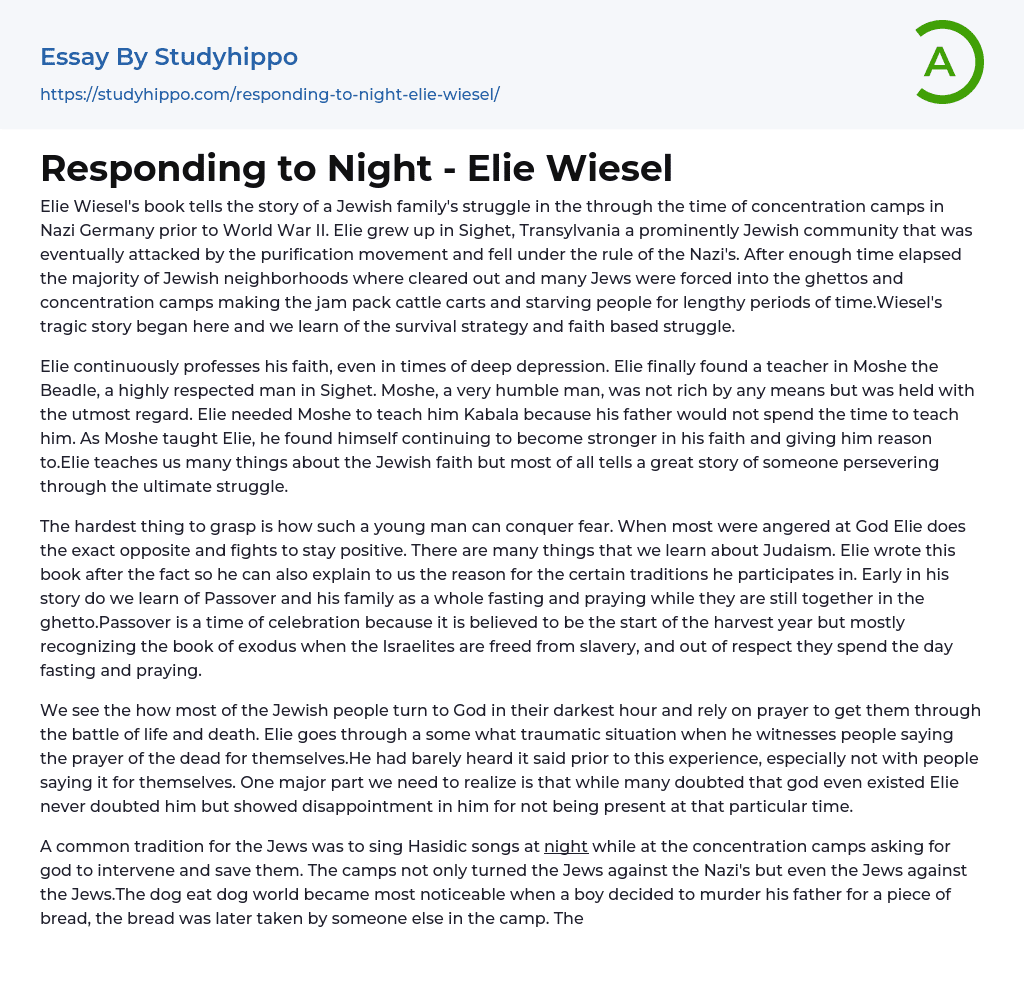Elie Wiesel's book depicts the ordeal of a Jewish family during the period of concentration camps in Nazi Germany before World War II. The author himself grew up in Sighet, Transylvania, a predominantly Jewish community that suffered attack from the purification movement and was eventually governed by the Nazi regime. The Jews were gradually cleared out of their neighborhoods and forced into ghettos and concentration camps, where they were packed tightly into cattle carts for extended intervals and left starving. This is where Wiesel's heartrending narrative begins, chronicling the struggle for survival and faith.
Despite experiencing profound despair, Elie maintains his faith without wavering. His search for a mentor led him to Moshe the Beadle, an esteemed resident of Sighet despite his lack of wealth. Elie sought Moshe's guidance in the study of Ka
...bala as his father was unable to teach him. Through Moshe's teachings, Elie found solace and gained renewed strength in his faith. Ultimately, Elie's story serves as a testament to the power of perseverance in the face of adversity and provides valuable insight into the Jewish faith.
The daunting task of conquering fear at a young age is what sets Elie apart. While others may have been angered at God, he remains optimistic. In addition to learning about Judaism, Elie's book provides insight into the traditions he practiced. In the early stages of his story, he recounts how his family observed Passover, fasting and praying together in the ghetto. Passover is a celebratory time marking the start of the harvest year and commemorating the Israelites' liberation from slavery. As a sign of respect, they abstain from food and engage in reflection and prayer o
this day.
We witness how most Jewish people turn to God in their darkest moments and rely on prayer to help them through life and death struggles. Elie's experience was somewhat traumatic when he heard people reciting the prayer of the dead for themselves, a prayer he had hardly heard of before, let alone recited for oneself. It's important to note that even though many people had doubts about God's existence, Elie remained steadfast in his belief but also felt disappointed that God wasn't present during that specific time.
While imprisoned in concentration camps, Jews would often sing Hasidic songs at night as they implored God to rescue them. Unfortunately, the appalling conditions of the camps led to hostility not only between Jews and Nazis but also among fellow Jews. The savagery of camp life is epitomized by a boy who murders his own father over a scrap of bread, which is then stolen by someone else incarcerated there. Such ruthless acts soon became routine, and one had to adapt to even the bleakest circumstances. Elie's father falls gravely ill and teeters on the brink of death.
Despite having a strained relationship with his father, Elie forms a strong connection with him and works hard to keep him alive. Although some criticize Elie for neglecting his own well-being by sharing his food with his father, he continues to care for him and finds motivation in the memory of a Polish boy they knew. When forced to jog, the Polish boy leaves his father behind and eventually dies from exhaustion while under the scrutiny of Nazi guards.
After completing his jog, the boy's father searches for his son and learns
of his murder, which deeply affects him. Consequently, Elie resolves to always stay close to his father. Progressing through the story, we experience Rosh Hashanah, which prompts Elie to reevaluate his beliefs about God's strength and his own autonomy over his fate. This leads to Elie feeling a sense of fury towards his deity for seemingly not aiding his fellow Jews, revealing the human side of a young Jewish boy.
While experiencing Rosh Hashanah, which is commonly linked to the number forty, Elie undergoes a psychological collapse after observing a gypsy assault on his father. Even though the circumstance is severe, Elie demonstrates minimal emotion and neglects to act. As he contemplates biblical tales such as Adam and Eve's temptation, Noah's building of the ark, and the destruction of Sodom and Gomorrah, Elie grows bitter about God's perceived absence of involvement and ultimately loses his faith. Unfortunately, Elie's father eventually dies from his injuries.
During his earlier years, Elie may have prayed in the morning, but now he appears lifeless and unresponsive. He does not shed tears nor receive criticism for this behavior because, like any mortal soul, he questions the existence of God which further breaks him down. It is difficult to comprehend how a fifteen-year-old boy can endure such suffering, which is believed to be one of the worst in human history.
Elie and his father witness the Nazi guards throwing Jewish babies into a fire pit upon their entrance to Auschwitz, the most infamous concentration camp. During this moment, Elie considers breaking ranks and running into the electrical fence, which would likely result in death. Despite the instances throughout the story where individuals prioritize personal
survival, the Jewish community often pulls together to support one another in times of need. This highlights how they display the utmost respect for their faith and tradition. The story also sheds light on significant Jewish traditions like Rush Hashanah and Passover, which have heritage predating Jesus and could possibly be celebrated by Christians as well.
The Kabala exhibits robustness which Elie comprehends when he delves deeper in faith. Amidst the extremities of a concentration camp, a force field separates regularity from abnormality, making it arduous to maintain faith. While fault cannot be attributed to those who denounced God under such circumstances, accolades must be given to those who upheld faith in their darkest hour. This book not only illustrates the resolve of a Jewish boy during the Nazi reign but also educates us on Jewish beliefs and how they weathered their most harrowing moments. Upon reading this book, one cannot help but feel immense respect for those who endured slavery during these times.




